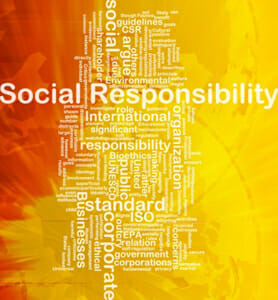
Feb 11, 2016 Social Responsibility and Corporate Event Planning

Best practices for C-level events can be broken into three categories: tailoring the event to your audience, strategic event marketing, and aligning the event with the corporate mission. In this post, the second in a series, I’ll start to drill down on the latter.
At Wilsonwest, we include corporate social responsibility (CSR) in our events as a matter of course and have been doing so long before the acronym CSR was born. Event producers ensure the food is sustainably produced, the trash at the end of the event is minimized, recycled or composted, and event flowers are delivered to local hospitals or health facilities. While these activities are meaningful, and not to be discounted, there are opportunities to make a much greater impact by aligning the activity to a company’s mission, vision and values.
Oftentimes for corporations, socially responsible event activity is not connected to the corporate mission. And we’ve discovered that while supporting causes on an ad hoc basis can do good and make a company’s employees and stakeholders feel good, when corporations are more strategic, the impact is greater for both the company and the causes they support. So when you begin to develop events with a social component, here are five best practices to consider. All are connected to each other.
1. Keep your efforts needs-based. With needs-based CSR, programs and the events supporting them are driven by the needs of customers, partners, and key stakeholders, who are encouraged to provide input into the event development process. Chevron was the corporation that inspired me the most in this arena, because of the rigor and thoughtfulness they demonstrate around their global sponsorships and community work. They spend a lot of time listening, observing, analyzing, and researching what is needed before they take action.
2. Reciprocal beats charitable. To use Chevron as an example again, they have a real understanding of how their social efforts connect to their business. It’s important for them to invest in science, technology, and education, because ultimately, Chevron needs future engineers to stay competitive. That’s why strategic social responsibility needs to land in the C- Suite: reciprocal is smart, sustainable, and makes good business sense.
3. Be specific. Understand why (and how) specific social activities drive your bottom line or improve your client’s lives. Develop measures to determine whether there’s a positive ROI for everyone involved in the event.
4. Stay connected to key customers, partners, and employees. Relationships should be nurtured and ongoing in order to identify strategic, needs-based efforts. When it comes to event planning and marketing, short-term, ad hoc relationships tend not to be as effective as sustainable, long-term partnerships.
5. Leverage relationships. Building relationships is at the heart of what we do here at Wilsonwest. We provide corporate event marketing, event planning, and management services to a broad spectrum of organizations – from major corporations to non-profits. This has put us in the unique position of being able to link corporations with causes and organizations for reciprocal relationships. So if you’re looking to get more leverage at an event, give us a call. We may be able to help you create more meaningful connections with your stakeholders by developing thoughtful activity that delivers lasting gains.

Sorry, the comment form is closed at this time.